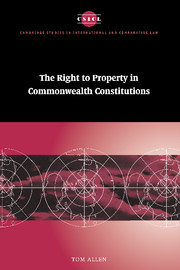Book contents
- Frontmatter
- Contents
- Table of cases
- Acknowledgements
- 1 Introduction
- 2 The right to property at common law
- 3 The development of written rights to property
- 4 Constitutional interpretation
- 5 The meaning of property
- 6 Acquisition and deprivation
- 7 Public purpose
- 8 Compensation
- Bibliography
- Index
- CAMBRIDGE STUDIES IN INTERNATIONAL AND COMPARATIVE LAW
5 - The meaning of property
Published online by Cambridge University Press: 28 July 2009
- Frontmatter
- Contents
- Table of cases
- Acknowledgements
- 1 Introduction
- 2 The right to property at common law
- 3 The development of written rights to property
- 4 Constitutional interpretation
- 5 The meaning of property
- 6 Acquisition and deprivation
- 7 Public purpose
- 8 Compensation
- Bibliography
- Index
- CAMBRIDGE STUDIES IN INTERNATIONAL AND COMPARATIVE LAW
Summary
At the centre of the constitutional right to property lies property itself. The meaning of ‘property’ varies according to its function in a particular context, and so we might conclude that it simply has no general meaning. Constitutional framers clearly did not share this view, since Commonwealth constitutions are written in terms of a right to ‘property’. Hence, we cannot know what the constitution protects without knowing what property is. The constitutional texts offer no guidance, as the vast majority do not attempt to define ‘property’. This task has been left to the courts, and so by determining the scope of property they determine the extent of the protection provided by right to property.
This chapter opens by considering the judiciary's sense of property. Most judges follow the legalist approach to interpretation, inasmuch as they work on the assumption that property does have a meaning that can be applied to most cases. However, while they seek to discover and apply the ‘plain meaning’ of property, their approach runs into the difficulties identified by Bruce Ackerman, who argues that property has two different plain meanings. The first is the meaning that the ordinary, non-lawyer would give to property; the second is the meaning that the lawyer would give to it. The first part of this chapter examines how Commonwealth courts choose between these two different meanings of property.
The ordinary, non-legal meaning of property would probably limit it to ownership interests in tangible objects.
- Type
- Chapter
- Information
- The Right to Property in Commonwealth Constitutions , pp. 119 - 161Publisher: Cambridge University PressPrint publication year: 2000



